Looking back to look forward
There have been seismic changes in the world of festivals this year.
Welcome to the eighth edition of my newsletter all about arts festivals. Hello to my new subscribers and to all my existing subscribers. It’s that time of year when we look back and reflect on the highs and lows of the year.
According to the British Arts Festivals Association (BAFA), there are an estimated 1,000 arts festivals in the UK delivering an extraordinary mix and diversity of work from niche small-scale festivals in remote rural locations to major international festivals in the country’s densely populated urban centres. It’s a sector that is reliant on a huge volunteer and freelance workforce, the latter often working way beyond their contracted hours. I know this to be true as that’s been my experience on every festival I’ve ever worked on.
Festivals provide a platform for artists and audiences to take creative risks, explore important issues of the day and give a voice to the unheard.
However, it’s ‘a sector that is surviving rather than thriving.’ Despite many festivals now delivering year-round activity, it is commonplace for small to mid-scale festivals to be reliant on yearly project funding. Therefore, delays to funding decisions and/or cuts to funding can be make or break for a festival’s financial sustainability. Add to that, rising costs and reductions in income, and it is therefore no surprise that we’ve seen so many festivals cancelled or postponed since Covid. For those that are still presenting their events, many are struggling. Even large-scale festivals such as the Edinburgh Festival Fringe Society this week shared its ‘perilous’ financial position, with expenditure continuing to outstrip annual income. While Bristol’s Mayfest has been paused for 2025 due to rising costs and financial challenges.
a sector that is surviving rather than thriving
The Association of Independent Festivals reported that since Covid, 192 festivals across the UK have been lost or have announced a temporary cessation due to rising costs, and 60 of those were cancelled or postponed this year.[1]
With festival finances so stretched, the ongoing controversies around festival sponsorship add to the growing list of macro challenges for festival organisers. Who can forget the furore in the summer regarding the investment company Baillie Gifford pulling its sponsorship of nine literary festivals including Hay, Edinburgh and Cheltenham following a campaign by Fossil Free Books (FFB). 200 authors including high profile names participated in FFB’s campaign. They demanded that Baillie Gifford divest from companies involved in the fossil fuel industry and those with links to the Israeli state. It’s interesting to see that the Fane Group, a company that programmes its own high profile author events and tours stepped into the gap left by Baillie Gifford to sponsor the Henley Literary Festival.
The arts sector has always been reliant on sponsorship and philanthropy and corporate brands understand that their relatively modest investments can deliver high impact returns, particularly in terms of brand association and reputation.[2] With recent lobbying campaigns and attacks on artworks such as the Just Stop Oil protests at national museums and galleries, it has once again raised the debate about the role of corporate sponsorship of the arts with often well-founded accusations of big business greenwashing. What’s been interesting to see is which arts organisations are sticking by certain sponsors and justifying their relationship, and which under intense media pressure are making the difficult decision to sever ties and thereby create a hole in their finances that needs filling. This is particularly acute for festivals that are already operating on extremely tight budgets where losing a sponsor means an immediate loss of programming or outreach work or staff. What will increasing scrutiny on corporate business sponsorship of the arts mean for festivals going forward? I suspect festivals, like other arts organisations, will need to communicate their brand values with corporate sponsors more effectively, as well as dig deeper into potential and existing sponsors’ associations and investments before continuing or developing relationships.
Festivals ‘encompass some of the UK’s biggest cultural exports, and simultaneously, some of the UK’s most hyperlocal offerings.’[3] Festivals research repeatedly shows the importance of festivals in terms of local engagement with 40% of festival audiences travelling less than five miles to attend a festival last year.[4] By their nature, arts festivals are rooted in their location and community, many established as a direct response to or inspired by the heritage of their place and people, creating a ‘symbiotic relationship between festivals and place.’[5] Local authorities, the primary funders of the arts in the UK, have always played an important role in supporting and developing festivals, whether for local community engagement, and/or to drive visitors to their areas. However, due to government austerity cuts, Covid, the cost-of-living crisis and the increased demand for statutory social and adult care, the decline in local authority arts funding has exceeded 40% over the last decade. And yet, local authorities across the UK are still finding ways to support festivals, many of which are free to attend, even if its only through in-kind support.
BAFA is calling for ‘a new vision for arts festivals, reflected in a festivals funding policy across the national arts councils, that addresses the inherent challenges in the annual funding model and give the sector the confidence and ambition to plan.’[6]
there’s a symbiotic relationship between festivals and place
Festivals are places for discussion and debate about the urgent stories of our time, so it is no surprise, that many have hit the headlines this year. For example, we’ve seen festivals around the world facing intense criticism for presenting work by artists exploring issues relating to the wars in Gaza and Ukraine. Palestinian artists are planning a Gaza Biennale as an ‘act of resistance and survival’ and are looking for overseas art galleries to host exhibitions too. Turner Prize-winning artist and filmmaker Steve McQueen recently pulled out of the Polish Camerimage Film Festival in protest at the festival director’s comments about female cinematographers. And an artist and activist jailed in Cuba has invited visitors to the Havana Biennial to visit him in prison.
However, despite the financial doom and gloom and political challenges of hosting a festival, new festivals continue to emerge. In such difficult times, the need for spaces and places to come together to experience that collective effervescence I wrote about in a previous newsletter is increasingly important. Next year, new festivals in the UK include three in London - a new youth dance festival, YFX Youth Festival at Sadler’s Wells, Roundhouse Three Sixty at the Roundhouse and Multitudes at the Southbank Centre. Derbyshire Makes, a three-year cultural programme, will kick off in March with a new annual spring festival taking place across the county. Full disclosure, I’m working on this! Whitby will host its first ever literature festival in November. Blaze Arts has announced a new youth-led arts festival in Burnley after receiving a Trusthouse Charitable Foundation grant award. Newcastle launches Come Together, the biggest outdoor music festival in the North East of England. Dialled In music festival will have a northern outing during Bradford UK City of Culture 2025. In February, Manchester is planning The SUPER DUPER Family Festival and there will be a new Birmingham Light Festival.
In the words of Val McDermid, writer and co-founder of Theakstons Old Peculiar Crime Writing Festival, ‘Preserving our festival heritage and building on it is no frivolous matter. We need the light that celebration gives us.’[7]
Lots of news this month as festivals make announcements before the year end and look ahead to 2025.
Festival News in the UK
Edinburgh International Festival (EIF) announces its first shows for 2025 and shares its concerns for the future following a 40% decline in public funding over the last decade as it waits to hear Creative Scotland’s funding commitments in January. EIF is also advertising for a Media Officer.
The Edinburgh Festival Fringe Society publishes its review of the year. EdFringe boss Shona McCarthy, who recently announced she’ll be departing for pastures new in March, has described the ongoing dispute between Summerhall and HMRC that has resulted in artists being owed huge sums of money as ‘absolutely horrific’.
Liverpool Biennial announces its theme and artists for 2025.
Pennine Lancashire’s British Textiles Biennial announces its theme and dates for 2025.
In London, Liberty Festival is looking for a producing partner for Wandsworth’s Borough of Culture year. The London Design Biennale has announced the Jury for next year’s edition, and London’s Latin Music Festival, La Linea has already revealed its line-up for next April’s festival with tickets on sale now.
Derby’s Assemble Festival shared this year’s highlights.
This year’s BFI London Film Festival received its highest in person attendance in ten years.
Manchester City of Literature announces a new literary festival partnership with Barcelona.
Greater Manchester will present a showcase of emerging music talent at Brighton’s The Great Escape festival in 2025, and the Greater Manchester Combined Authority is offering grants for artists to participate.
Chester Photo Festival recently staged a pilot exhibition at the Castlefield Art Gallery New Art Spaces in Chester in the run up to the annual festival in May 2025.
The Welsh Museums Festival celebrated its 20th anniversary this year.
Artist Daksha Patel, who I had the pleasure of working with on Asia Triennial Manchester many years ago, has been selected for the Illumine light art commission by Light Up The North.
More light festivals news with the Lightlab 2024 artist development opportunity by Lightpool in Blackpool and Light Night Wigan, and artist commissions available for Light Up Leicester 2025.
Fraser Wilson is the new Artistic Director at Swaledale Festival.
Submissions are now open to participate in SXSW London.
The Association of Independent Festivals will hold its annual congress in Bristol in February 2025.
Also in February next year is Outdoor Arts UK’s National Conference which will take place in Stoke-on-Trent with the theme of Equity in Action: The Power of Diverse Narratives. There are 20 bursaries available to UK members too.
The Centre for Culture, Sports and Events at the University of West Scotland has just launched the Playbook for Equality, Diversity and Inclusion in Festivals and Events.
Sheffield Docfest has released its 2024 festival report as Managing Director Annabel Grundy announces her departure and so the festival is now looking for a new Managing Director, as it welcomes in a new Chair Anne Morrison.
Belfast International Arts Festival is looking for a part-time Development Manager.
Blaze Arts is looking for a freelance Festival Director for its new festival.
Buxton International Festival announces BBC Newsreader Clive Myrie and Tony Hall, The Lord Hall of Birkenhead CBE as new Honorary Vice-Presidents.
The Hay Festival has revealed Jay Hunt as the new Chair of its Global Board.
Festival News from across the world
Hay Festival in Peru scores a Culture Medal to celebrate ten years of the festival.
The 16th edition of Manifesta will take place in the Ruhr, Germany.
Sydney Festival announces its 2025 programme.
A new scientific advisory panel is being set up to advise Documenta 2025 after this year’s anti-Semitism controversy.
After a six-month delay, this year’s Dakar Biennale of Contemporary African Art, aka Dak’Art, exploring the legacy of slavery has opened in Senegal with positive reviews.
India’s Kochi-Muziris Biennale reveals its curators for the sixth edition taking place from 12 December 2025 to 31 March 2026.
Canada’s Stratford Festival is looking for an Artistic Director.
Thailand unveils a season of winter festivals to attract visitors.
The recent month-long Shanghai International Arts Festival delivered a welcome boost for the city’s tourism drawing 20,000 visitors from abroad, accounting for 8% of the total audience.
The 60th Venice Biennale has just drawn to a close and whilst total overall visitors were down in comparison to the last edition, the festival saw an increase in visitors from underrepresented groups.
Nova Gorica-Goriza in Slovenia, one of the European Capitals of Culture for 2025, has revealed that its grand opening ceremony will take place on Saturday 8th February with an all-day borderless parade connecting the two urban centres. Nova Gorica-Goriza shares the title next year with the region of Chemnitz in Germany.
December is a quieter month for festivals as seasonal holidays take hold, but there are a few to look out for.
Upcoming UK highlights
Lightwaves takes over The Quays in Salford and Bolton’s Put Big Light On Festival returns. Put the big light on is a phrase I grew up with in our household - such a great name for a festival in the north of England.
The International Anthony Burgess Foundation in Manchester hosts the Reimagined City: Festival 2024.
For those that celebrate Christmas, there’s the York Early Music Christmas Festival.
An the Hay Festival Winter Weekend is on now, but if you can’t get there in person, you can still watch it online.
Upcoming international highlights
Light festivals continue with Amsterdam Light Festival, Granada’s Alumbra Light Fest in Spain and Lyon’s Fêtes des Lumières.
Goa hosts the 9th edition of the Serendipity Arts Festival in India.
Santa Maria da Feira in Portugal stages the contemporary circus festival Leme. And for jazz lovers, Festa do Jazz takes over Lisbon.
The International Divine Comedy Theatre Festival happens in Poland with shows competing to win the Divine Comedian prize.
The Jewish International Dance Week takes place in Jerusalem, Israel.
And there’s the Venice International Performance Art Week in Italy.
For classical music lovers, Tallin in Estonia hosts the Virumaa Music Festival.
The BAO Sound Experience in Brescia, Italy is a winter festival that focuses on the relationship between sound and city.
And finally, a clutch of film festivals includes Marseille’s Rencontres Internationales Sciences & Cinémas in France, Merlinka Queer Film Festival in Belgrade, Serbia, Athens International Digital Film Festival in Greece and the EUROSHORTS Young Filmmakers International Film Festival in Gdansk and Warsaw, Poland.
Season’s Greetings! Back at the end of December with a preview of festivals for 2025.
P.S. If you liked this post, please click on the heart at the bottom or top of this post. It helps others to discover PalmerSquared on Festivals and I’ll be very thankful.
All images taken by me at the launch of this year’s Christmas light trail, Dunham Massey’s Illuminated Christmas Trail.
This post has been edited as I had erroneously called the Dunham Massey Christmas light trail Glow, which is actually at the RHS Bridgewater. So many light trails and events, see my last article on light festivals.


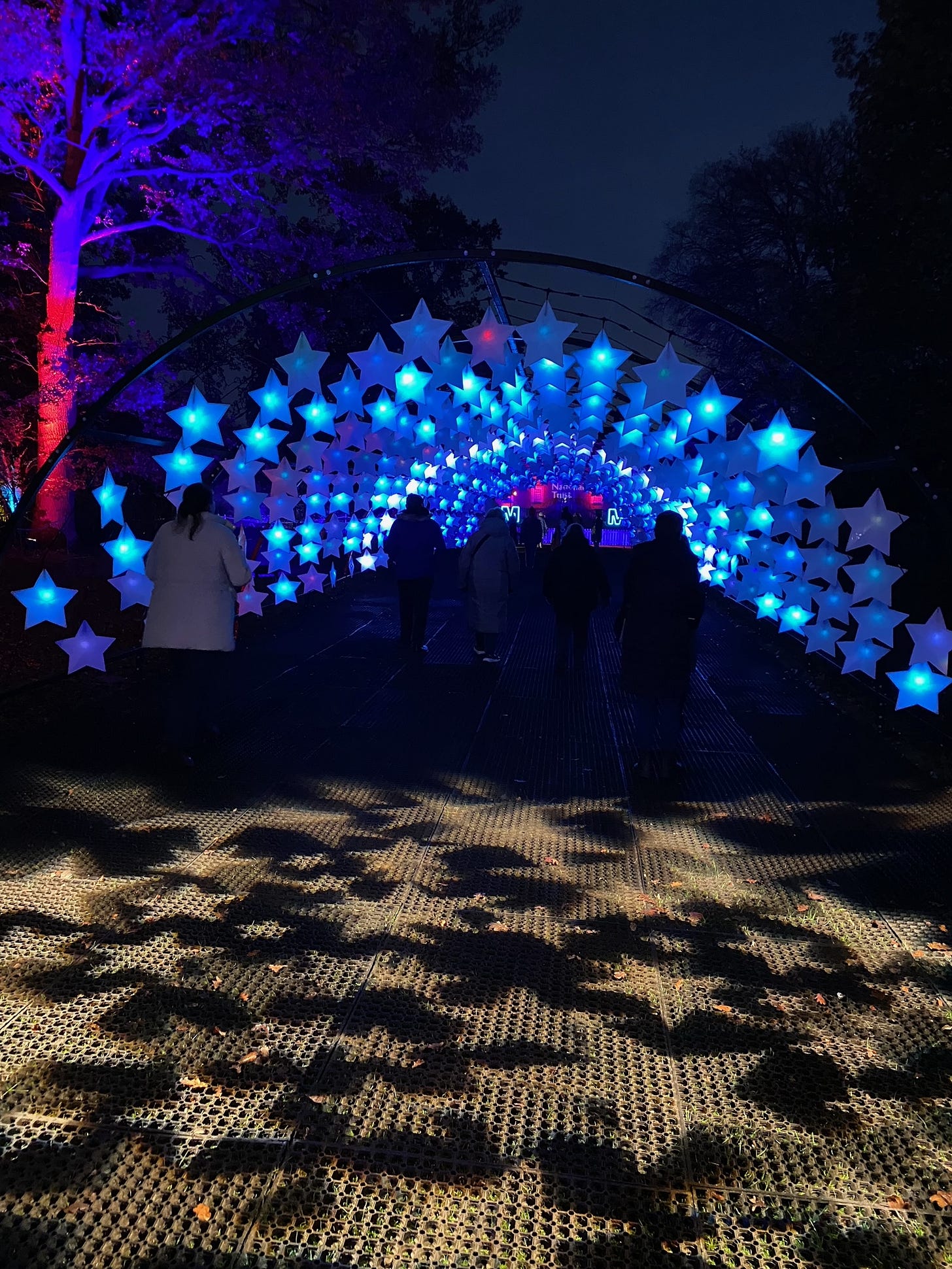
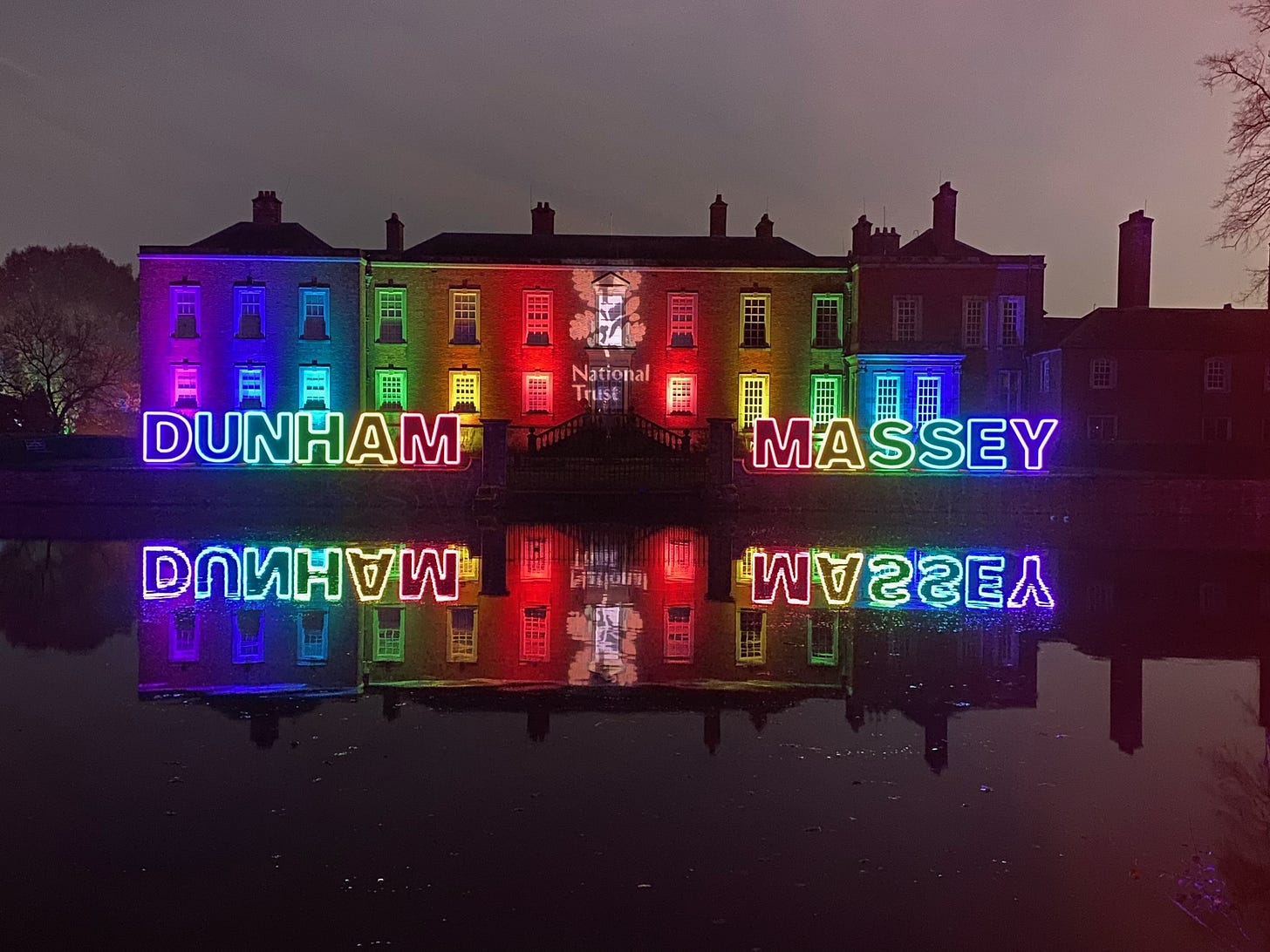
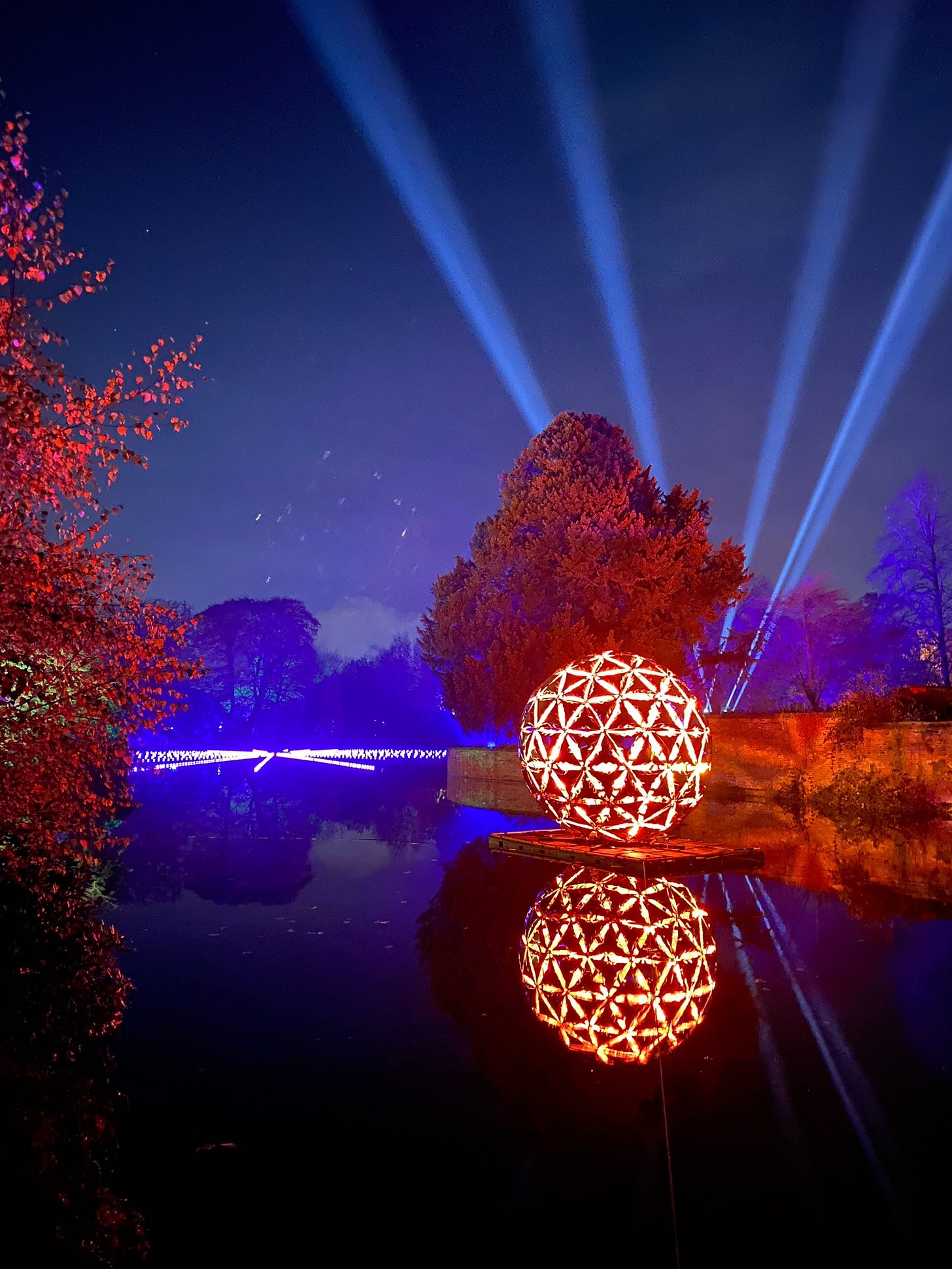
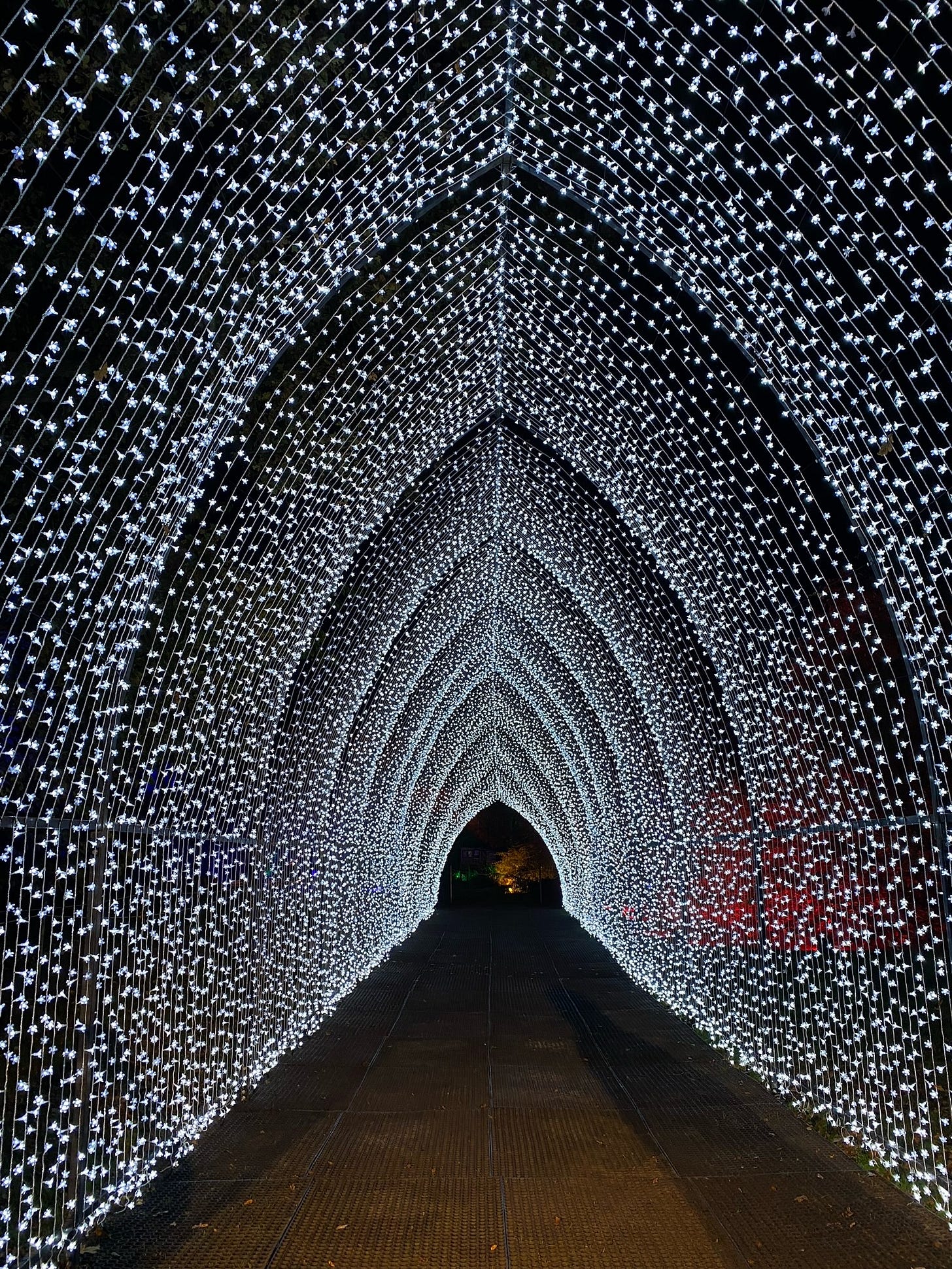
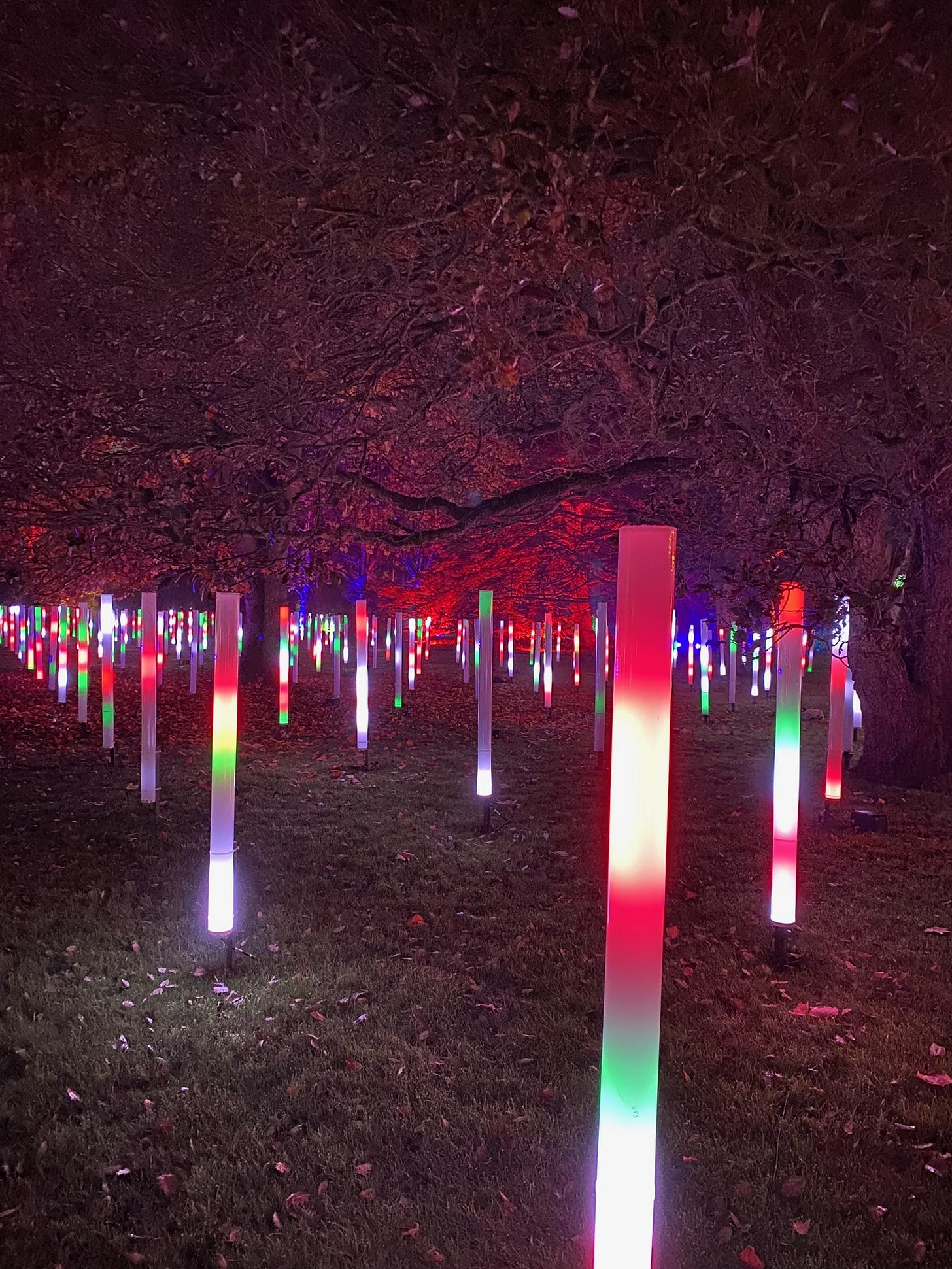
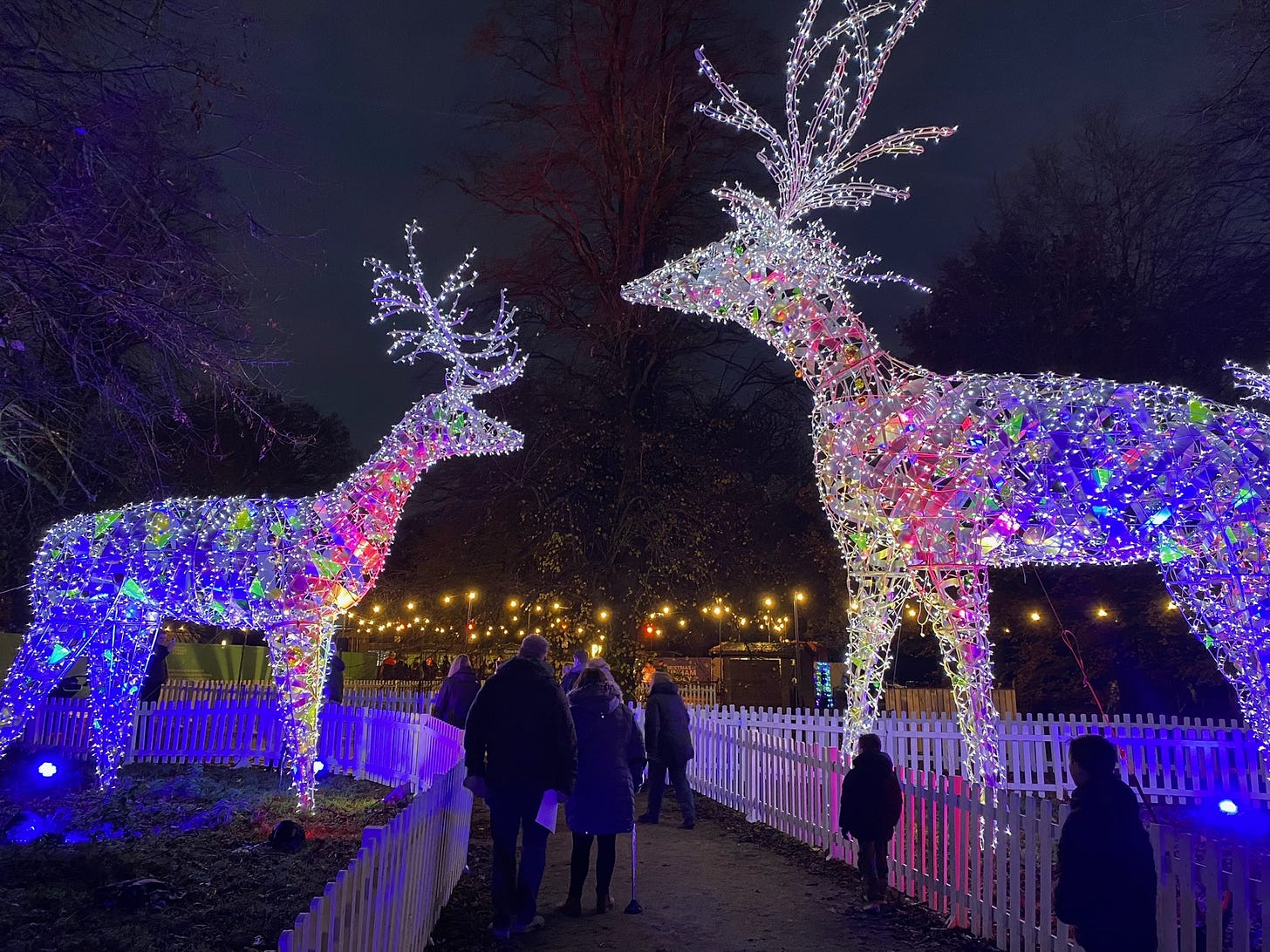
As ever, an incredibly thorough round up. I am really heartened to see some new festivals starting and I'm always fascinated at the sponsorship models and how they are partnered. Thanks Helen.
Glow looks rather gorgeous, Helen. Thanks for the glimpse. And for this really useful festival news and round-up.